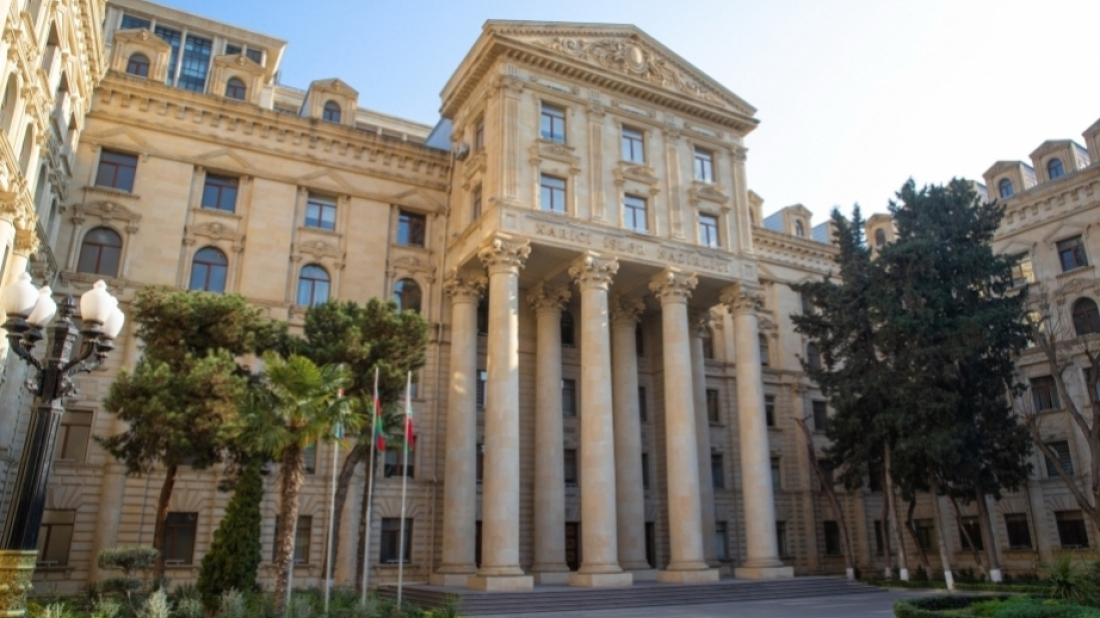Kazakhstan vows to fast-track AZAL crash investigation amid rising diplomatic tensions
Kazakhstan has vowed to speed up its investigation into the Azerbaijan Airlines (AZAL) crash near Aktau, as mounti...

A statement was issued by Azerbaijan’s Foreign Ministry on March 31, marking the Day of Genocide of Azerbaijanis.
“Today marks the 107th anniversary of the March genocide of 1918, one of the largest genocides committed by radical Armenian groups against peaceful Azerbaijanis in the last century, when thousands of compatriots were brutally killed on ethnic and religious grounds.
On 31 March—Day of Genocide of Azerbaijanis—we commemorate innocent victims of these tragic events with respect and honor.
During these massacres, which were part of a systematic policy of ethnic cleansing and genocide against Azerbaijanis, the killings of innocent Azerbaijanis were carried out with extreme brutality in Baku, Shamakhi, Guba, Garabagh, Zangazur, Nakhchivan, Shirvan, and Irevan by 6,000 armed soldiers from the Baku Soviet and 4,000 soldiers from the Dashnaksutyun Party, as admitted by Stephan Shaumyan, Extraordinary Commissioner of the Caucasus and an ethnic Armenian, under the pretext of "fighting counter-revolutionaries." As a result of these massacres, over 16,000 people were killed, and 167 villages were destroyed with particular savagery in Guba alone.
The atrocities carried out against cultural and religious monuments, mosques, and cemeteries belonging to Azerbaijanis during this massacre, when tens of thousands of our compatriots were killed, stand as clear evidence of the crime of ethnic hatred and intolerance.
Although, following the establishment of the Azerbaijan Democratic Republic, special institutions were set up to investigate these events and raise awareness in the international community, and 31 March was observed as a day of national mourning, the fall of the Republic hindered the political and legal assessment of this crime.
After the restoration of our independence and the return of the National Leader Heydar Aliyev to power, a political assessment of this genocide was made through the Decree “On the Genocide of Azerbaijanis” dated 26 March 1998.
The policy of ethnic hatred and intolerance, which underlies the massacres committed at the beginning of the twentieth century, persisted through the mass deportation of Azerbaijanis from the territories of present-day Armenia, atrocities committed against our people during the conflict and occupation, crimes against humanity such as the Khojaly genocide at the end of the century, as well as war crimes against civilians during 44-day Patriotic War in 2020.
Although the current post-conflict period offers historical opportunities to turn the pages of these tragic chapters in the region's history and establish lasting and irreversible peace, the territorial claims that have fueled all the atrocities to date—and are enshrined in the Constitution of Armenia and various legislative acts —remain the greatest obstacle and source of concern for the region’s stable future.
In this regard, Azerbaijan continues its national and international efforts to hold those responsible for the crimes accountable, while remaining firm and unwavering in its demand to end Armenia's ongoing territorial claims against our country, in pursuit of lasting peace in the region.
On 31 March, the Day of Genocide of Azerbaijanis, we solemnly and respectfully pay tribute to the memory of innocent Azerbaijanis who suffered from ethnic hatred and genocide. May Allah rest their souls in peace!” as mentioned in the official statement.
The Kremlin is utilising the recent United States and Israeli military strikes on Iran to validate its ongoing war in Ukraine. Russian officials are pointing to the escalation in the Middle East as evidence that Western nations do not adhere to international rules.
Saudi Arabia’s state oil giant Saudi Aramco closed its Ras Tanura refinery on Monday following an Iranian drone strike, an industry source told Reuters as Tehran retaliated across the Gulf after a U.S.-Israeli attack on Iranian targets over the weekend.
The Middle East crisis intensifies after the deadly attack on the compound of the Supreme Leader of Iran Ali Khamenei on Saturday that killed him, other family members and senior figures. Iran has launched retaliatory strikes on U.S. targets in the region.
U.S. President Donald Trump said the U.S. military has enough stockpiled weapons to fight wars "forever"; in a social media post late on Monday. The remarks came hours before conflict in Iran and the Middle East entered its fourth day.
Türkiye raised its security level for Turkish-flagged vessels in the Strait of Hormuz to Level 3 on Sunday (2 March). The development follows Iranian restrictions on shipping after U.S. and Israeli strikes and confirmation of Supreme Leader Ali Khamenei’s death.
Seven opposition parties in Georgia have formed a coordinated alliance ahead of upcoming elections, saying it aims to challenge the dominance of the ruling Georgian Dream party. The government has dismissed the move as a rebranding of familiar political figures.
Türkiye’s President, Recep Tayyip Erdoğan, has described the ongoing U.S.–Israeli military campaign against Iran as a “clear violation of international law”, in his strongest remarks yet on the escalating regional crisis.
U.S. President Donald Trump said the U.S. military has enough stockpiled weapons to fight wars "forever"; in a social media post late on Monday. The remarks came hours before conflict in Iran and the Middle East entered its fourth day.
Kazakhstan has vowed to speed up its investigation into the Azerbaijan Airlines (AZAL) crash near Aktau, as mounting diplomatic pressure and geopolitical tensions push the disaster further into the international spotlight.
Entrances to Iran's underground and previously bombed uranium-enrichment plant at Natanz have been struck as part of the U.S.-Israeli military attacks on the country, the United Nations nuclear watchdog, the International Atomic Energy Agency (IAEZ) confirmed on Tuesday (3 March).
You can download the AnewZ application from Play Store and the App Store.

What is your opinion on this topic?
Leave the first comment